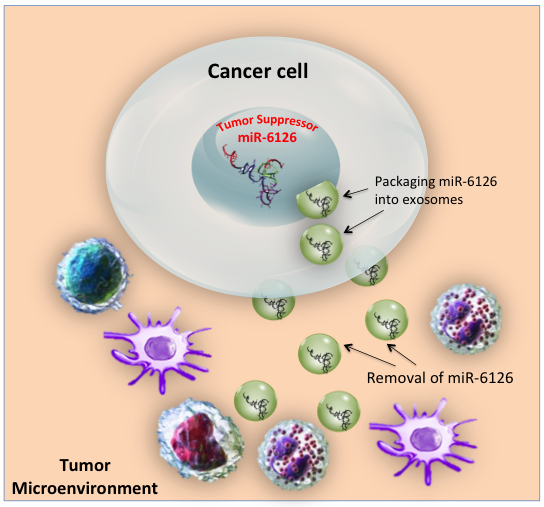11.29.16 last updated.
11.29.16 last updated.
Cancer cells actively reprogram gene expression to promote their ability to produce tumors. One way this reprogramming is carried out is by subverting the main routes of cell-to-cell communication by loading exosomes (vesicles that bud off from cells) with specific miRNAs that either promote or suppress tumors and then releasing them into the tumor microenvironment. In a Cancer Research paper published online recently (Kanlikilicer et al., 2016), we found that miR-6126, a miRNA that was reported to be correlated with better overall survival in high-grade serous ovarian cancer patients, is ubiquitously removed from ovarian cancer cells via exosomes.

We found that miR-6126 suppresses tumors by directly targeting integrin ß1, a key regulator of cancer cell metastasis. Treatment of orthotopic mouse models of ovarian cancer with miR-6126 reduced tumor growth, proliferating cells, and microvessel density. Our findings provide new insights into the role of exosomes in mediating tumor progression and suggest a new therapeutic approach to disrupt the origin and growth of tumors.
Citation:
Ubiquitous release of exosomal tumor suppressor miR-6126 from ovarian cancer cells
Pinar Kanlikilicer, Mohammed Saber, Recep Bayraktar, Rahul Mitra, Cristina Ivan, Burcu Aslan, Xinna Zhang, Justyna Filant, Andreia M Silva, Cristian Rodriguez-Aguayo, Emine Bayraktar, Martin Pichler, Bulent Ozpolat, George A Calin, Anil K. Sood and Gabriel Lopez-Berestein*
Cancer Res. October 14, 2016 doi: 10.1158/0008-5472.CAN-16-0714
*Corresponding author
The hunt for fatal myocardial infarction biomarkers
MicroRNAs in Human Cerebrospinal Fluid as Biomarkers for Alzheimer’s Disease
There are no comments.